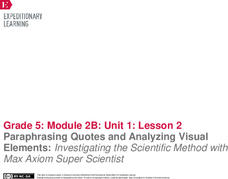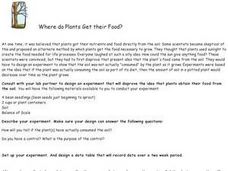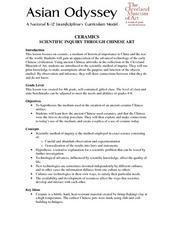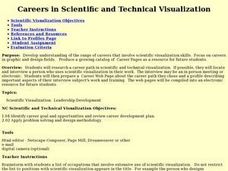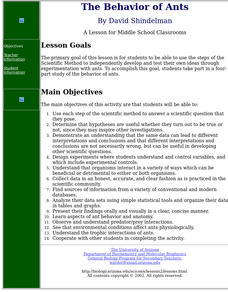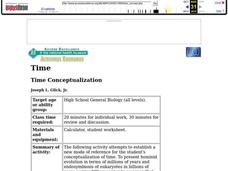EngageNY
Paraphrasing Quotes and Analyzing Visual Elements: Investigating the Scientific Method with Max Axiom Super Scientist
Pay close attention. Learners discuss the things close readers do and record them in a chart. They then silently reading section 1 of Investigating the Scientific Method wit Max Axiom Super Scientist and write the gist of the text in...
Curated OER
Scientific Method
Sixth graders explore the scientific method. In this scientific method lesson plan, 6th graders write acrostic poems regarding the steps of the scientific method, experience an Alice program regarding the method, and create story boards...
National History Day
A Clever War: Scientific and Technological Advances in World War I
Technology—changing lives and transforming war. Your tech-loving historians examine photographs and primary documents to explore how technology changed not only World War I, but also how it moved society forward. They apply their...
Film Foundation
To Kill a Mockingbird: What Is a Movie?
The challenge film makers face when creating a film based on a novel or nonfiction text is the focus of a interdisciplinary resource that uses To Kill a Mockingbird to teach viewers how to read the visual images of film. A must-have...
Perkins School for the Blind
Conductors of Heat - Hot Spoons
Why is the end of a spoon hot when it's not all the way in the hot water? A great question deserves a great answer, and learners with visual impairments will use their auditory and tactile senses to get that answer. A talking...
Curated OER
Where Do Plants Get Their Food?
Plants need food to survive, just like any other living organism. Young biologists analyze an experiment performed in 1610 by Jan van Helmont to determine if plant nutrition is obtained through the soil. First, lab groups work together...
Howard Hughes Medical Institute
Visualizing Gene-Expression Patterns
How do genetics gurus know so much about gene expression? See traits materialize before your very eyes using a presentation with embedded simulations. Science scholars develop an understanding of the techniques used to follow the work of...
Manchester University
Lesson 51: Scientific Notation
Discuss scientific notation with this mathematics lesson plan. Middle schoolers predict which problem is bigger of two numbers. They analyze the problems by observing the powers of 10 in order to decide which is bigger. This appears to...
Curated OER
What's Your Genus? Scientific Classification and the VT
Students understand the definition of binomial nomenclature. In this binomial nomenclature lesson, students classify ordinary animals by seeking their scientific names. Students participate in a knowledge hunt using binomial nomenclature.
Curated OER
What's in a Name?
Learners explore the plants that grow in Glacier National Park. In this plant biology activity, students invite a guest speaker to speak about plants that grow in Glacier National Park, as well as the scientific names for the plants....
Curated OER
Body Biography: The Lion, the Witch and the Wardrobe
Class groups assume the identity of one of the primary human characters in The Lion, the Witch and the Wardrobe. They create a body biography that identifies the most important traits of their character, translate these traits into...
Curated OER
Mississippi Trial, 1955: A Request Strategy for Questioning
Knowledge, comprehension, application, analysis, synthesis, evaluation. Class members use Bloom's taxonomy to craft six levels of discussion questions for Chris Crowe's novel, Mississippi Trial, 1955. Model questions from Chapter 3, a...
Curated OER
Investigating Brass Instruments and Pitch
Students observe the sounds of different brass instruments in order to understand how to create different pitches. In this musical instructional activity, students create a "brass" instrument from everyday household objects. The students...
Howard Hughes Medical Institute
EarthViewer
Can you imagine Washington DC and London as close neighbors occupying the same continent? Learners will be fascinated as they step back in time and discover the evolution of the earth's continents and oceans from 4.5 billion years ago to...
Virginia Department of Education
The Particle Theory of Matter
Demonstrate the particle theory of matter to high school scientists with an engaging experiment that allows them to visually see the results as substances change from one state to another. The class concludes with a discussion about how...
NOAA
Stressed Out!
Are our oceans really suffering due to the choices humans make? The sixth and final installment in the volume of activities challenges research groups to tackle one of six major topics that impact ocean health. After getting to the...
Curated OER
Ceramics Scientific Inquiry Through Chinese Art
Fourth graders explore, examine and study ceramics, a medium of historical importance to China. They review the advanced technology of the early Chinese civilization and are introduced to the scientific method of inquiry and make...
Curated OER
Careers in Scientific and Technical Visualization
Students research a career path in scientific and technical visualization. They prepare a Career Web Page about the career path they chose. The web pages be compiled into an electronic resource for future students.
Curated OER
The Behavior of Ants
Young scholars use the steps of the Scientific Method to develop and test their own ideas through experimentation with ants.
Curated OER
Time Conceptualization
High schoolers use this activity to establish a new mode of reference to the conceptualization of time. To present hominid evolution in terms of millions of years and endosymbiosis of eukaryotes in billions of years carries little...
Curated OER
Naming New Species
Students explore science of taxonomy and the Five Kingdoms of life,
categorize organisms into Kingdoms, and create multi-media presentations illustrating knowledge of a Kingdom. They collect data and related pictures on the Internet,...
Curated OER
Are We Couch Potatoes or Busy Bees? Data Analysis of Physical Activity in School
Students study practical data analysis within the constraints of the scientific method. In this data lesson students collect and enter data into a computer spreadsheet then create graphs.
Curated OER
Sunny Delight
First graders explore completing experiments through the scientific method.
Curated OER
Where Do Plants Get Their Food?
Students think about the historical development of the scientific method. They design an experiment that replicates van Helmont's, using only specified materials. Pupils then improved upon van Helmont's procedure and also consider the...


